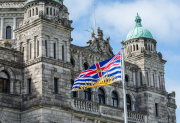Leadership, like a relationship, requires work. You can’t rest on the laurels of previous commitments any more than you can keep referencing that great birthday present you bought seven years ago every time you forget to do the dishes. You need to stay committed to new ideas, new policies or new ways to rekindle the flame. And there’s no better place than Paris to be reminded how true this is.
We might look back on 2015 as the year Canadian political leaders ran out of excuses for inertia on climate change. 2015 saw the political and social shifts required for genuine progress finally emerge: the decade-long Keystone XL battle demonstrated that citizens expect government to better integrate climate risks into their decision making, a global wave of carbon-pricing announcements made our Canadian inaction all the more tenuous, and federal antagonism on climate change evaporated on October 19.
When it comes to climate leadership in Canada, British Columbia swept us off our feet in 2008 with a world-leading carbon tax, clean-energy requirements and a low-carbon fuel standard. Praise came from all corners, including the World Bank, the OECD and governments around the world. Most importantly, provincial emissions started to go down. B.C. was seen as a climate leader, not just among Canadian provinces, but internationally.
These days, B.C. has lost the romance on climate change. 2013 saw a freeze on the carbon tax at $30/tonne and we’ve seen limited new initiatives to reduce emissions. And sure enough, B.C.’s emissions are starting to creep up. A report prepared by the Climate Leadership Team, a blue-ribbon advisory panel appointed by Premier Christy Clark, indicates that B.C. will miss its 2020 target. But if B.C. had steadily built upon the climate plan from 2008, it would be much further ahead today.
The Climate Leadership Team recommends the B.C. government move forward with an improved carbon tax, increasing by $10/tonne each year starting in 2018. It also recommends mitigating impacts on the energy-intensive trade-exposed part of our economy (about two per cent of GDP at $30/tonne) and reducing the provincial sales tax. This, and other policy ideas, could result in the necessary changes required to transition to a low-carbon economy.
Strong action on climate is becoming the new normal in Canada. More than ever, Canada’s federation is presenting a united front on climate change. With Alberta’s recently announced plans to implement a carbon tax and get off coal, Ontario’s coal phase-out and commitment to cap and trade, and Quebec’s carbon market and hydraulic-fracturing moratorium, B.C. is in good company.
Critically, the federal government has also recognized the need to accelerate the pace of progress on emissions reductions across the country. On their own, provincial climate commitments will not ensure Canada does its fair share to reduce emissions consistent with the science of global warming. More action on carbon pricing and other emissions-reductions policies will be required, and the federal government should play an additive role. There are big opportunities for the federal government to encourage actions from the provinces as well as specifically accelerating coal phase-out nationally, promoting renewable energy, matching the Obama administration’s methane-reduction commitment, and reducing emissions from buildings and transportation.
The Paris summit may spur the global community towards new emissions-reductions targets, but translating that global ambition into real change is the work we need to do at home.
Luckily, B.C. has lots of examples of strong climate action to build on in its own backyard. We are home to some of the greenest buildings in the world, including a LEED Platinum-certified office tower. We boast a city committed to 100 per cent renewable energy, and over 220 businesses in that city have signed a pledge for strong climate action. We are home to clean-tech companies that provide goods and services around the world.
But tonight, we’re in Paris to celebrate 2015’s big climate wins, and the Canadian jurisdictions that made those policy transformations possible. B.C. is among the jurisdictions that have helped to move Canada forward. As the romance of Paris fades, the work to continue being a leader begins. B.C. needs to continue to build momentum across industry and local businesses, with civil society, First Nations and Métis leaders, to ensure we keep moving forward. Here’s hoping Paris puts the spring back in B.C.’s step.
Josha MacNab is the B.C. director for the Pembina Institute; Tim Gray is the executive director of Environmental Defence and Sidney Ribaux is cofounder and executive director of Équiterre.






